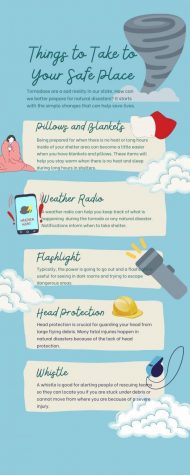Q&A Weatherman Ben Smith
April 26, 2021

Crimson Crier: Tell me about where you were and what it felt like on April 27, 2011.
Ben Smith: I was working at WHNT News 19 in Huntsville. I only had been at the station just over a year. My first day was April 21, 2010. The emotions of that day were seral. We knew that could be a big day from looking at the parameters from the night before. With a HIGH RISK for the Storm Prediction Center (they issue Severe Weather Outlook), there are only one of those issued every once every year and a half. High risks often result in multiple tornadoes and deaths. It was overwhelming. 92 tornadoes warnings were issued from the NWS in Huntsville that day. That is almost one tornado every 15 minutes for a day on average. We were on in the morning and then from around 11am to midnight non-stop. It was tough keeping up with multiple tornadoes are one time.
CC: Since the 2011 tornadoes, have you noticed a change in response from Alabama residents during severe weather threats?
BS: I think people understand now serious tornadoes can be in north Alabama. They are now taking things more serious when the chance of severe weather in the forecast. There are more shelters, more apps, and tools to get warnings in the last 10 years. There are more tools to increase the lead time for tornadoes. The CC tool (debris detector) is a new tool in the last five years or so. This tool detects things other than rain drops. You can see foreign objects (debris) with this tool.
CC: In what way do you believe those 2011 storms impacted our state the most?
BS: I think everyone takes storms more seriously now. Having a plan when severe weather threatens. I think we have stepped the warning progress and safety (getting warnings, actions, more private and public shelters).
CC: What type of conditions are needed to spark a tornado outbreak like we saw in Alabama on April 27, 2011?
BS: All the parameters we use like instability, shear, energy, LLJ (lower level jet – fast winds at the lower part of the atmosphere), a trigger (boundaries)…when all of those are ‘off the chart’, it means things could be very serious.
CC: Why is it important for the public to stay informed when there is possible severe weather and tornadoes?
BS: Have multiple ways to get warnings. Have a weather radio that is programmed for your county. Even multiple counties that are need you. It’s designed to wake you up. Live Alert 19 with your location and alerts turned up is a great resource. Don’t rely on outdoor sirens. You might not hear them, they might be broken.
CC: What supplies are important to keep in your household in preparation for bad weather?
BS: Have a plan in place. If you live in a mobile home, find a sturdy shelter for the nice. Have a bike helmet, football helmet. Weather radio with batteries, wear shoes. If a warning is issued, go to an interior room. A bathroom, closet, and basements are good. Underground shelters are good.
CC: What information do you think is most important for individuals in Alabama to know going into tornado season?
BS: Just know that Alabama is in tornado alley. March, April, and May are the peak of tornado season with a secondary season in November. Tornadoes can occur at any time during the year. With new folks moving in, they need to be aware of what tornadoes are and what to do when they are in the forecast.
CC: What is your biggest hurdle when giving a severe weather forecast?
BS: Making sure everyone knows they can get a tornado and it doesn’t matter where they live. No one is immune. If you are on a mountain, valley, city, or country, you can get one and they can cause damage. As meteorologist we can’t tell you who will get a tornado before they come. People ask often if “this city” or “that city” will get a tornado. We can’t do that. We can give you lead time when a warning is issued so you can take cover. It goes back to having a plan.
CC: What is the best shelter to seek when a tornado is approaching?
BS: Most are pretty good. I would just familiarize yourself with area shelters online. You can always research shelters and buy your own. Just ask around and check ratings. There are several people in Alabama that have them.
CC: Why did you decide to make meteorology your career?
BS: I have loved the weather since I was in grade school. I did the weather on the announcements in high school. It’s been a passion of mine for a long time. It came easy to me to understand weather patterns.
CC: What advice do you have for young people who wish to make meteorology a career?
BS: I would concentrate on math and science. I would watch the weather on TV. I would read the weather discussions from the National Weather Service and Storm Prediction Center. I picked up a lot while watching the local weather.
